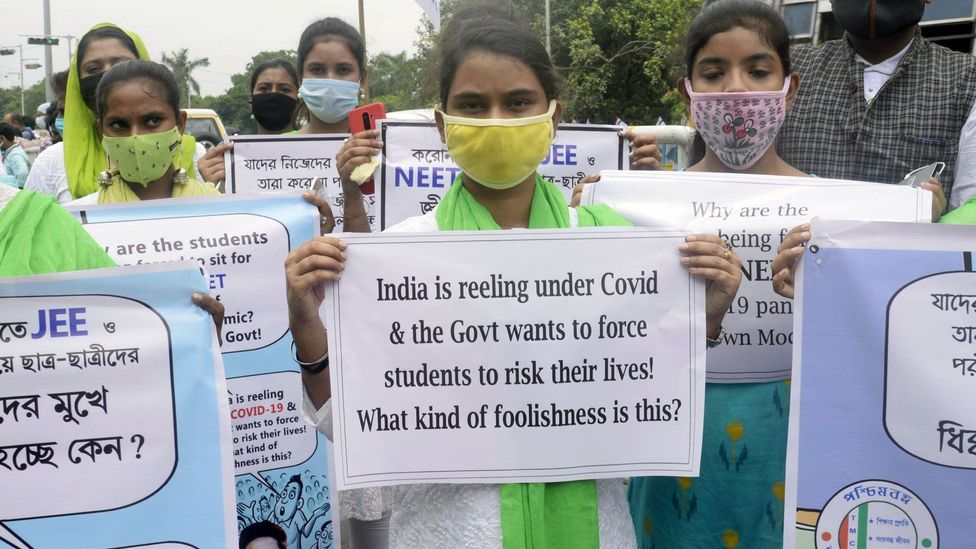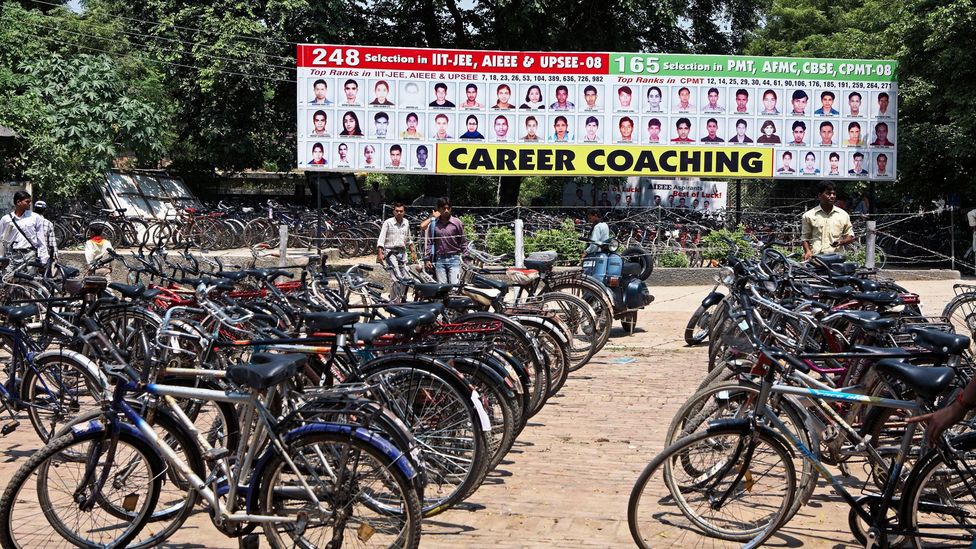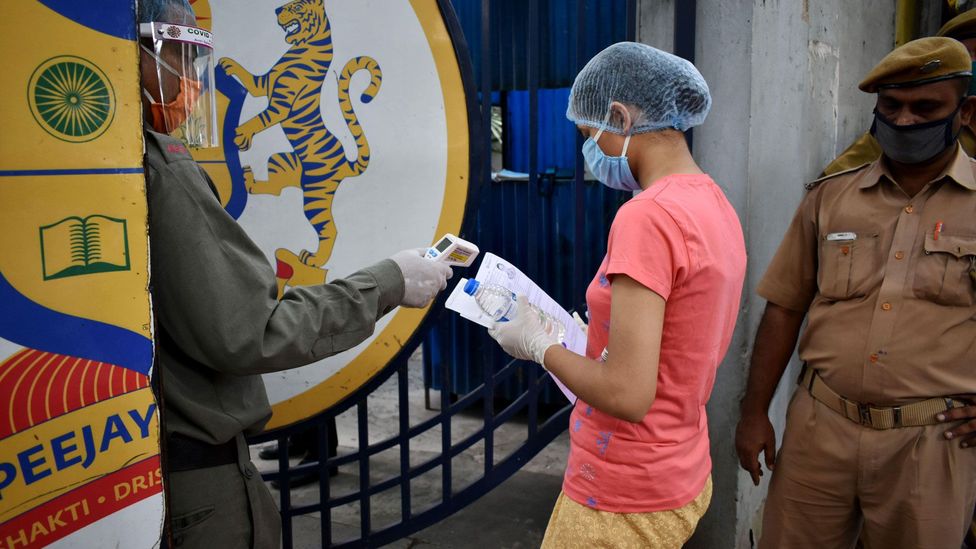Early on 10 December, more than half a million students from across India tuned into a live address by the education minister, broadcast simultaneously on Facebook and Twitter. #EducationMinisterGoesLive was meant to address students’ concerns about upcoming university-entrance examinations, which have been shrouded in uncertainty due to the pandemic.
Although touted as an interactive session, it largely featured two parties talking past each other. The minister praised India’s education system for surmounting pandemic-related challenges, even as the livestream’s comment boxes were flooded with panicked students insisting that they were struggling to cope and that exams must be postponed.
Campaigns demanding exams be delayed have been a near-permanent fixture on Indian social-media timelines since the initial Covid-19-enforced lockdowns forced the suspension of all exams in March. The most crucial among the deferred exams were the Joint Entrance Examination (JEE) and the National Eligibility cum Entrance Test (NEET), which determine eligibility for courses in the fields of engineering and medicine.
Education is a brutally competitive arena in India, and competition in the STEM fields is toughest. The prestigious Indian Institutes of Technology (IITs) accept only one in 50 applicants. (For perspective, Harvard takes one in 19, and Oxford, one in six.) With hundreds of thousands of students applying every year, exams like the JEE and the NEET are specifically designed to eliminate large numbers of candidates. Losing a mark or two can mean sliding thousands of ranks down the pecking order.

Government attempts at rescheduling examinations have been met with protests by students demanding further postponement or cancellation (Credit: Alamy)
To bend these seemingly impossible odds in their favour, students often spend most of their teenage years preparing for these exams. Most enrol in coaching institutes that specialise in training students to ‘crack’ the exams, prioritising exam prep to the exclusion of all other pursuits. It’s all in the hope that admission at a name-brand college like an IIT will set them up for a successful career. Graduates hired out of the best of these colleges receive salaries of around $50,000 on average. It’s a prize considered well worth the effort in a nation where the per capita income is just above $2,000.
However, this year, most of these students have had their standard exam preparation derailed by Covid-19, lockdowns and an uneven shift to online education. During the hour-long interaction with the minister, students complained that patchy internet connections and the stilted nature of learning over video had made classes difficult to follow and doubts impossible to clarify. The end result for many was that while they had ostensibly been taught the syllabus, they had understood little, and were woefully unprepared for the most crucial exams of their lives.
Operating almost entirely without regulation, India’s coaching institutes represented a $4bn industry by 2015. These institutes come in all shapes and sizes, from large chains with operations across the country to smaller mom-and-pop operations that cater to their immediate neighbourhoods. In some cases, the local economies of entire towns are dependent on their reputation as a hub for coaching centres. The most famous of these, Kota in the state of Rajasthan, attracts an estimated 100,000 students every year.
The prestigious Indian Institutes of Technology accept only one in 50 applicants; for perspective, Harvard takes one in 19, and Oxford, one in six
“Their only focus is preparing you for the university entrance exams,” explains Bindu Tirumalai, who works with the Centre for Education Innovation and Action Research at the Tata Institute for Social Sciences in Mumbai. “What they’re teaching students is how to crack these multiple-choice questions. They know them so well now – how they are designed, how to recognise patterns, how to eliminate definitely wrong answers, narrow down the options – these are the kind of design ideas they use, and they’re really good at it.”
Some coaching centres are extremely difficult to get into, even setting their own entrance exams. And the culture is notoriously exhausting. Ravali Prasad Edara, who got into an IIT in the early 2000s through a coaching institute and is now a teacher with a large coaching chain, describes the years she spent preparing for the JEE as “gruelling”. The classes she attended, in the city of Hyderabad, would start at 0400 and end at 1000, after which students could attend school. There were also strict dress codes and socialisation guidelines. She says, “Whether it was me back then, or whether it is the students I’m coaching now, there is absolutely no social life.»
Attending these coaching classes is a substantial commitment – but many students consider spending years on this arduous hamster wheel worth it if it translates into a coveted place at a top educational institution. But, despite students’ best intentions to revise, the pandemic had other plans for their exam preparation.

A busy coaching centre in the city of Lucknow advertises the successes of its former students (Credit: Alamy)
“When the lockdown was imposed, my daily study schedule was devastated, and I lost interest in studying. I was more concerned about tracking when the exam would be scheduled,” says Deepshikha, 19, who spent nearly four years preparing for the exam, juggling school with the demanding schedule of a coaching centre for two of those years.
Although most coaching centres finished teaching the syllabus before the lockdown was imposed, students lost out on time usually reserved for revision and mock tests. “With the switch to online mode, we struggled a lot,” says Asvini Thilai, 18, who took a year off after completing school to focus on preparing for the NEET. Although Thilai comes from the southern city of Chennai, she enrolled in a coaching centre in Delhi because she believed that living in a competitive environment would make her study harder. When lockdown was imposed, she had to return home, which was difficult. “Many couldn’t get used to it. Some couldn’t focus on studying because they lived with large joint families, while some had technical issues.”
According to Edara, the unique conditions the pandemic created affected students used to the rigorous discipline of the coaching centres. “These students have been forced to just study, study, study for years together. There’s little else to their lives. They hardly get 10 days off in a year, every Sunday they’re writing exams,” she says. “When you offer them that freedom midway, they’re obviously going to grab it. So, they stopped studying, they were watching a lot of TV, and they were trying to catch up on all the missed movies over the last few years.”
These students have been forced to just study, study, study for years together. There’s little else to their lives – Ravali Prasad Edara
After months of limbo, the government announced that both the NEET and JEE exams would be held in September, leading to intensified protests by students and reports of a number of suicides. Despite mounting pressure, Prime Minister Narendra Modi side-stepped the issue, choosing to use his monthly address to the nation to appeal to Indians to adopt native dog breeds instead. Students registered their protest by hitting the dislike button more than 800,000 times on a YouTube upload of the broadcast, which prompted the PM’s official channel to disable the functionality.
Jyotiraditya Raman Singh, who lives in Lucknow in the northern state of Uttar Pradesh, took the JEE in September. “I had to think about protecting myself from the virus and deal with the pressure of giving a big exam at the same time. In the exam centre, students and invigilators come from everywhere – so there was a huge fear of getting infected, which kept playing on my mind.” The pandemic severely hampered his preparations, and he failed to make the cut at any of the top engineering colleges he had hoped to get into.
For Deepshikha, this year was her second and final crack at the JEE. Her score wasn’t sufficient to get her into an IIT; she thinks she will now have to settle for a second-rung university in her home state of Jharkhand. Thilai, who attempted the NEET this year, also didn’t do as well as she had hoped. She is now in the process of applying to dental colleges, which have slightly lower eligibility criteria.

A student’s temperature is taken before she enters a test centre to write the NEET in Kolkata (Credit: Alamy)
The National Testing Agency, which conducts the JEE, has declared that students will be offered four attempts at the exam next year instead of the usual two. However, in order to accommodate the extra rounds, the 2021 exam schedule will begin from February instead of April. There’s been no official word on NEET yet, but it seems unlikely that it will be postponed either. Despite many coaching centres still being shut or operating online, and India closing in on 10 million Covid-19 cases, in a few months, students will be expected to travel to test centres to take their exams.
“They’re not prepared,” says coaching teacher Edara. “They’ve had online classes for five months, but they’re telling us they never studied at home, they just listened to classes or half the time they just muted us.” It’s little wonder, then, that social media is once again filled with demands for exams to be postponed.
Yet while the scheduling debate rages, there is little talk of re-evaluating the systemic issues in India’s higher education system – such as the lack of sufficient university seats and the resulting overemphasis on cracking exams at the cost of actual learning.
“The crisis could have been used to rethink the system, but it hasn’t panned out that way,” says Soumitra Pathare, a psychiatrist and Director of the Centre for Mental Health Law and Policy at the ILS Law College. Rather than long-term solutions, Pathare says the focus of public discourse has been around whether cancelling or further delaying exams would amount to wasting a year. “There’s one thing that has really killed a lot of hopes for young people this year and that is the uncertainty. It would’ve helped to have had a clear plan right from the beginning as to whether the exams would be held and when. Because if there’s anything that breeds anxiety, it’s uncertainty.”
For Rishit Polepeddi, a 17-year-old student from Hyderabad, next year’s JEE is a “career defining moment” for which he will be inadequately prepared. “Online classes haven’t been very useful. Our syllabus isn’t even half complete, and it’s very hard to understand even what has been taught because there’s no real interaction with the teachers.”
Disappointed with his coaching centre, Polepeddi has engaged a private tutor and turned to YouTube tutorials to help him make up the slack. “I think I may be able to complete the syllabus by myself by the exam date. If that doesn’t happen, then I will have to drop out and try again next year.”
Fuente de la Información: https://www.bbc.com/worklife/article/20201214-why-indias-competitive-testing-treadmill-never-stops







 Users Today : 126
Users Today : 126 Total Users : 35431306
Total Users : 35431306 Views Today : 169
Views Today : 169 Total views : 3369366
Total views : 3369366